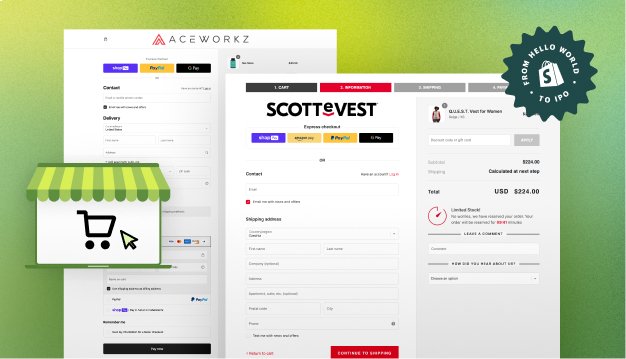
Exploring E-Commerce Solutions
Customer expectations have changed since the first online stores, and new sales strategies have replaced outdated methods. E-commerce is no longer an add-on or an afterthought. Many people started doing business exclusively on the Internet, and users have already forgotten that they used to make their first Internet purchases with fear in their eyes. Today, buying and selling goods online is as commonplace as coffee in the morning. As time passes, more and more e-commerce options and solutions are becoming available. When selling online, businesses need to keep up with the times, and only the most advanced solutions can help them. Otherwise, your business risks being left behind.
The Internet provides businesses with lots of new opportunities. In recent years, the phenomenon of e-commerce has been gaining momentum. Let’s take a look at what it is and how it differs from regular commerce.
E-commerce and its significance in the modern business world
The rapid growth of e-commerce has profoundly impacted traditional retail, fundamentally changing the way people shop and the strategies businesses employ.
E-commerce can be compared to a shopping mall – a vast assortment of goods that a buyer can look at and buy without leaving home. A characteristic feature of e-commerce is that all transactions are carried out from electronic devices that are connected to the network. For entrepreneurs, e-commerce is primarily about providing services or selling goods via the Internet.
Over the past two decades, e-commerce has experienced exponential growth, with online sales increasing steadily every year. In parallel, consumer behavior has changed: consumers have embraced e-commerce because of its convenience. The convenience of shopping from home, the wide selection of products, and competitive prices have contributed to this surge in online sales.
Types of e-commerce solutions
Before delving into this topic, it is worth understanding the terminology. E-commerce is a model of economic relations that is implemented on the Internet. E-commerce solution is a set of tools and technologies designed to facilitate the process of buying and selling goods and services online, it is all trade and financial transactions conducted on the Internet or made from an electronic device connected to a network.
These solutions cover various functionalities related to multiple aspects of the e-commerce process to provide businesses with the necessary tools to create and manage online stores. It includes online transactions of various types between different participants in economic relations, such as business-to-business (B2B e-commerce solutions), business-to-consumer (B2C e-commerce solutions), and consumer-to-consumer (C2C e-commerce solutions).
B2B e-commerce solutions are tools and platforms designed to facilitate business-to-business transactions over the Internet. B2B e-commerce involves transactions between a manufacturer and a wholesaler or a wholesaler and a retailer through various online channels for sales.
These solutions are specifically designed to meet the unique business needs and processes associated with B2B commerce, which often involves bulk production and sales volumes, more complex pricing principles, and numerous stakeholders.
B2B e-commerce is one of the fastest-growing sales models.
B2C (Business-to-Consumer) e-commerce solutions include a variety of tools that allow businesses to connect with individual consumers and provide a seamless online shopping experience.
C2C e-commerce solutions allow people to engage in peer-to-peer sales and purchases. These solutions typically act as intermediaries, connecting buyers and sellers in a virtual marketplace. The success of these platforms often depends on creating a sense of trust within the community through reliable rating systems and secure transactions.
Problems and solutions to setting up an e-commerce site
There is no doubt that e-commerce is the future of business. Whether you run a small business or manage a large enterprise, staying attuned to the emerging trends in this booming industry is essential for success. Although e-commerce creates growth opportunities, retailers may face several challenges and problems. We have addressed the main ones.
Growing demand for data protection and cybersecurity
To succeed online, retailers need to earn the trust of their customers. Reliable privacy protection and cybersecurity are critical factors in making this decision. So, if an e-commerce store doesn’t provide optimal security, no one will risk buying products from such companies. Furthermore, a single security breach can jeopardize an e-commerce business and cost someone years of hard work. To prevent this from happening, companies need to
- purchase a proper SSL certificate from the hosting company and make sure it’s always up to date;
- use updated protocols such as HTTPS – they are essential for high search engine rankings and also ensure that the website is secure;
- improve the security of servers and admin panels;
- use anti-virus software to prevent credit card data from being transferred to criminals from websites.
Omni-channel customer service
One of the biggest challenges facing an online retailer is achieving an effective omnichannel customer experience. Customers expect to be able to contact the seller through any number of touchpoints, such as website, phone, email, social media, store, etc. All of these touchpoints need to be unified. To create an effective omnichannel strategy, a retailer needs to think about the potential customer needs and implement the right service technology.
Cancellation of purchase
This is a huge problem for e-commerce. Even e-commerce giants are not immune to it. A long and complicated checkout process causes customers to run away from the site without making a purchase.
Returns and refunds
More than 60% of online shoppers say they look at the seller’s policy before making a purchase. When a site says “no returns or refunds,” it makes the buyer prefer another e-commerce site. When buying online, customers want the space to make a mistake that won’t cost them anything. Therefore, a flexible return and refund policy will not only contribute to customer satisfaction but also help increase sales.
Conversion rate
Increasing conversion rates is an exciting challenge that most online merchants face. It’s also a key metric for measuring the success of an e-commerce business. So, to increase conversion rates and sales, sellers need to make sure they create a solid and consistent online presence for e-commerce businesses. Online merchants need to identify target customers and create effective marketing strategies based on their interests and needs. Also, website optimization with effective SEO strategies and engaging content that resonates with the target audience also helps to increase the conversion rate.
Ecommerce Website Development
In this digital age, building an e-commerce website can help expand your target market, increase business awareness, and boost revenue. Since many e-commerce platforms are available, deciding which e-commerce development solutions to build an online store or whether to choose a homegrown e-commerce solution can take considerable time and effort.
E-commerce website development is the process of creating a website that allows a company to sell various products and services. Front-end and back-end development for e-commerce websites include checkout systems, payment processing, website security, and much more. Web agency work involves many steps, such as website design, developing user-friendly interfaces, integrating secure payment gateways, managing product catalogs, and implementing features that improve the overall customer experience.
The goal of e-commerce development is to create a website as a user-friendly and secure platform for online sales. Website developers create functionality for e-commerce that helps customers easily navigate through pages, find their favorite products, and make purchases seamlessly. This builds trust among users and leads to increased sales and conversions. An e-commerce platform is a type of software that is used by online stores to fulfill all the needs of buyers and sellers. These include product pages, reviews and comments, transactions, payments, order fulfillment, logistics, shipping, and returns.
When connecting an online marketplace to the internal processes of a business, you need to consider the unique workflows and business requirements specific to online commerce. Custom e-commerce solutions allow you to maximize the benefits and returns for business growth. Custom e-commerce is a solution that will hold all SKUs, transactions, marketing functions, and operational software integration (e.g., ERP, CRM, EHR, and SCM).
Custom e-commerce solutions can realize many individual requests of your B2B, B2C, or other e-commerce model. With a custom e-commerce platform, you can optimize the following workflows and customize them to your business model:
- Inventory tracking across multiple locations
- Ordering, invoicing, and customized pricing
- Product configurators
- Custom shopping lists
- Bulk import of products
- Multi-currency and multi-language e-commerce support
High-volume stores require much more robust infrastructure and functionality to run their websites. For a large or fast-growing business, the website must be built on a platform that can serve millions of customers and huge volumes of web traffic.
The online e-commerce solution software should also fully meet the requirements of the business. Accounting, marketing, customer service, and other vital functions are necessary to maintain and continuously grow your business.
Shopify e-commerce solutions
Lately, many online entrepreneurs have heard about Shopify’s e-commerce solution platform as an alternative to traditional marketplaces and an ideal system for creating an independent e-commerce business.
Shopify is a cloud-based e-commerce platform that was invented in Canada in 2004. Its goals included creating an online store that would allow the realization of sales in several channels simultaneously with minimal effort. Shopify is an e-commerce platform or website-building tool that provides business leaders with all the tools they need to create an online store. It provides users with various themes that they can customize to suit their specific sales and branding needs and comes with all the payment processing solutions needed to sell physical and digital goods.
Shopify is designed specifically for e-commerce newbies, with an easy-to-use server environment and plenty of built-in guides. However, it also allows you to expand and customize your store with code as your company grows. Shopify even has its template language (Liquid) and supports CSS and HTML.
It’s easier for small businesses to reach a turnover of five-digit sales per month and in a year can accelerate their business to 200-300 thousand dollars per month using the Shopify platform.
Shopify currently powers around 4.4 million websites in 175 countries, making it a significant player in the e-commerce industry.
Advantages Of Shopify Platform-Constructor
- Opportunity to create a full-fledged online store on a highly adaptive platform with high-speed information processing;
- Pleasant design, created with the help of proposed templates, without the need to study program codes;
- Multiple payment options;
- Selling digital and physical goods;
- Integration into a single system with social networks and messenger profiles;
- Responsive websites of the online store for laptops, computers, tablets, and mobile devices;
- Use of applications (over 4000 of them are provided in total) that automate tasks for traffic acquisition, SEO audit, inventory, conversion, two-way communication, retargeting, and much more;
- The availability of many tutorials helps you to utilize the options appropriately offered and one of the best support services in the world for complicated moments.
Shopify is one of the best online commerce solutions on the market. It is infinitely flexible, giving businesses all the freedom they need to sell a variety of digital and physical products. However, it is far from the only e-commerce tool. Today’s business leaders have a vast range of platforms to choose from to build their online presence. Finding the right solution for your needs means scrutinizing each platform’s features and capabilities.
Choosing the most suitable e-commerce platform depends on the scale and needs of the business. A thorough research is required to decide which platform offers the best opportunity to optimize the potential of a particular business.
Also, when choosing an e-solution for a sales platform, it is essential to consider factors such as:
- Ease of use
- Basic e-commerce functionality
- Ability to use custom design and customizability of the interface
- Available payment methods and third-party integration
- SEO and marketing tools
- Price-to-quality ratio
- Customer support
Choosing the right ecommerce solution can help businesses increase sales, improve customer service, and optimize overall operations.
E-commerce solutions are a critical component of a successful online business strategy. The right solution can optimize sales processes, expand the customer base, and improve customer service and the quality of goods and services.
Websites should grow as the business grows. Businesses should constantly look for opportunities to expand functionality and improve customer service.
Constant updating and development of an e-commerce website is the key to its success and competitiveness in the market. Only by adapting to changes, improving the user experience, and ensuring security and relevance would businesses be able to attract and retain customers, grow, and reach new heights in e-commerce.
To summarize, e-commerce is a constantly evolving trend, and staying ahead is the key to success. The pace of innovation in this area has led to the emergence of new industries and directions, as tasks that would have taken years to realize in the days of simple stores now take months or even weeks.
The digital economy is gaining momentum every month: approximately 8 billion people inhabit our planet, and 50 billion devices are already connected to the Internet. E-commerce is now a significant part of the global financial market. Technology and people are constantly evolving, and because e-commerce brings it all together, we will always be looking to the future.








